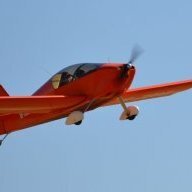This is just a reposting of a thread I put on the Sonex builder's forum. There has been a fair amount of discussion recently about fitting heavier engines, particularly the Corvair, although that would be an unlikely choice in Australia. however, their is a price to pay when you increase the maximum all up weight from that specified by the designer.
I can't tell you what the fatigue life of a Sonex is because it depends on so many different factors, but there has been a fair bit of discussion recently about the pros and cons of fitting heavier engines and flying with a greater maximum all up weight so I thought I'd toss in a bit of information about one of the consequences of increasing the weight of your Sonex.
The above graph shows stress against number of cycles to failure. It's not necessarily for 6061-T6 but it is a typical for S-N curve for aluminium. You'll notice that the bottom scale is logarithmic, not linear. If you pick any particular stress and then add just 10% to it, say by going from 200 MPa to 220 MPa, it results in roughly a halving of the fatigue life.
You could argue that the Sonex is so strong that fatigue will never be a problem, and you could be right. I certainly have confidence in my Sonex but there is a weak point, even in those massive main spars, and it's not hard to increase all the stresses by 10%. For example, by increasing the MAUW from 1150 pounds to 1250 pounds, an increase of 8.7%, you are actually increasing all the loads by about 9.6% (the weight of the wings doesn't count as part of the load). If you'd like to read about this in a bit more detail, go to my blog at How Strong is the Sonex? | Peter Anson – Engineering
Peter
Sonex 894
357 hours and going strong







